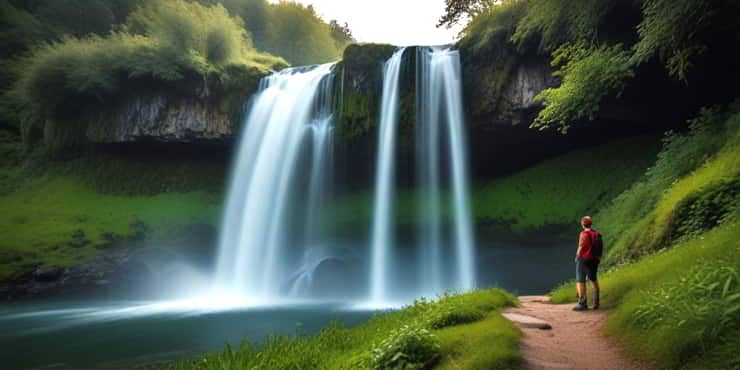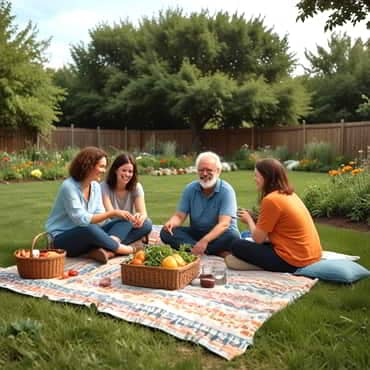The Benefits of Going Outside Everyday: Nature’s Therapy

Estimated reading time: 10 Min
There’s a resurgence of interest in the benefits of going outside everyday in recognition of how nature serves as a counter to today’s relentless pace of life.
Nowadays, screens often eclipse the sun, and the call of the wild—a gentle breeze, the rustle of leaves, the tranquil sight of a flowing river—becomes ever more inviting.
From the scientifically proven health advantages to significant enhancements in creativity and emotional well-being, the following explores why time spent outdoors is indispensable to the human spirit.
We explore both tangible and intangible benefits that the natural world provides for us.
I include a list of reference materials for those who want to learn more.
The Science Behind The Benefits Of Going Outside Everyday
There are natural benefits for both physical and mental health.
Physical Health Benefits
The healing touch of nature extends far into the realm of physical health, offering a panacea for the body’s many ailments.
Research consistently shows that immersion in natural settings can lead to significant reductions in blood pressure, heart rate, and stress hormones.
A study published in the Journal of Environmental Psychology found that participants who simply walked in a forested area reported lower levels of cortisol, a stress marker, compared to those who navigated urban environments.
Moreover, the phytoncides—natural oils within plant life, especially trees—have been linked to enhanced immune system performance, further cementing nature’s role in promoting physical well-being.
Mental Health Improvements
The mental health benefits of stepping outside are as clear as the skies after a refreshing rain.
Time spent in green spaces has been associated with reduced levels of stress, anxiety, and depression.
An important research project from Stanford University revealed that participants who regularly walked in natural surroundings exhibited decreased activity in a brain region associated with a risk for mental illness compared to those who walked in urban areas.
This connection between nature exposure and mental health suggests that regular visits to parks, forests, and other green spaces can be an essential component for maintaining psychological health.
Cognitive Benefits and Enhanced Creativity
Nature is undoubtedly a dynamic environment that stimulates and refreshes the mind.
Studies have demonstrated that individuals who engage with natural environments experience improvements in memory, attention, and cognitive flexibility.
The University of Michigan, for example, found that memory performance and attention spans improved by as much as 20% after subjects spent an hour interacting with nature.
This advantage is attributed to the restorative effect of natural settings, which allows the cognitive system to recharge, much like the body recuperates during sleep.
Creativity and Nature’s Muse
Beyond cognitive restoration, nature acts as a catalyst for creativity.
Natural landscapes can unlock creative potential, providing a relaxed space free from the distractions of daily life.
Research supports this, showing that people who spend time in nature or even view scenes of nature are more likely to exhibit creative problem-solving skills.
It’s as if the mind, when in the embrace of the natural world, finds fertile ground for the seeds of new ideas and perspectives to grow.
Emotional Well-being and Nature
The emotional connection humans have with nature is profound and healing.

Natural environments offer a unique sense of peace and emotional recovery, distinct from the often chaotic human-made world.
The concept of “forest bathing,” a practice originating in Japan known as Shinrin-yoku, highlights the therapeutic effects of being in forests.
It encapsulates how nature can bring about a state of meditative calmness, fostering emotional stability and resilience.
This practice underscores the restorative power of nature, both as a physical space and as an emotional sanctuary.
Personal Reflections and Anecdotal Evidence
Uplifting stories abound of individuals finding solace and emotional healing in nature.
From the calming effect of a solitary walk along a beach to the exhilarating feeling of reaching a mountain summit, these experiences speak to nature’s capacity to heal and rejuvenate the human spirit.
Such testimonials to the emotional benefits of outdoor engagement illustrate how nature acts as a silent therapist, listening and soothing without a word.
Social Connections Strengthened by Nature
The fabric of our social lives can be enriched and deepened through shared experiences in nature.
Outdoor activities inherently promote cooperation, communication, and the strengthening of bonds.
Whether it’s a family hike through a local trail, a community clean-up at a nearby park, or a team-building exercise in the wilderness, nature’s settings provide a unique backdrop for nurturing relationships.
Family Bonds and Friendships
Outdoor adventures offer unparalleled opportunities for families and friends to create lasting memories together.
These experiences away from the distractions of technology and routine life allow for meaningful conversations, shared challenges, and collective achievements, strengthening ties in profound ways.
Research highlights that families who engage in regular outdoor activities report higher levels of satisfaction in their relationships.
Building Community and Professional Relationships

The great outdoors also serves as a fertile ground for sowing seeds of community and professional relationships.
Initiatives like community gardens not only greenify urban spaces but also bring together individuals of diverse backgrounds, fostering a sense of belonging and teamwork.
Similarly, companies are increasingly turning to outdoor team-building retreats, recognising the value of nature in breaking down hierarchical barriers and cultivating a culture of mutual respect and collaboration.
Nature as a Gateway to Personal Development
Embracing the wilderness and its myriad challenges is a journey towards self-discovery.
Nature, with its inherent unpredictability and vastness, provides a canvas against which one’s character is tested and resilience is built.
Self-Discovery Through Outdoor Challenges
Activities such as solo hiking, mountain climbing, or even navigating the complexities of camping in the wild serve as metaphors for life’s challenges.
They demand resourcefulness, courage, and persistence—qualities that, once honed in the wilderness, translate into valuable life skills.
The accomplishment of overcoming natural obstacles stimulates a sense of achievement and confidence that enriches the individual’s sense of self.
Confidence and Resilience
The unpredictable nature of the outdoors teaches adaptability and resilience.
Weather can change, paths can become obscured, and physical limits can be tested.
These challenges not only build physical stamina but also instill a sense of confidence in individuals to face life’s uncertainties with a calm and steady mind.
The resilience developed in the face of natural adversities is a testament to the human spirit’s capacity to endure and thrive.
Practical Tips for Incorporating Nature into Your Daily Life
Acknowledging the myriad benefits of nature does not necessitate a radical lifestyle overhaul.
Incorporating the outdoors into one’s daily routine can be simple and accessible, regardless of geographical constraints.
Making Nature a Daily Habit
Small, intentional actions can significantly enhance one’s connection to the natural world.
This can be as simple as taking a daily walk in a local park, cultivating a garden, or even just spending a few moments under the sun.
For those living in urban environments, seeking out green spaces or rooftop gardens can offer a slice of nature amidst the concrete.
Weekend Escapes and Vacation Ideas
For those able to allocate more time, weekend hikes, visits to national parks, or camping trips can provide deeper immersion in nature.
Planning vacations around natural landmarks or outdoor activities can also be a rewarding way to explore new environments and reap the therapeutic benefits of the outdoors.
FAQs
1. How much time should I spend outdoors to see health benefits?
Even short periods of time spent outdoors can be beneficial. Studies suggest that as little as 120 minutes per week in nature can lead to noticeable health and well-being improvements.
2. Are there benefits to spending time in urban green spaces versus wilderness areas?
Yes, both environments offer benefits. Urban green spaces can reduce stress and enhance mood, making nature accessible to those in city settings. Wilderness areas offer deeper immersion and potentially greater benefits due to their biodiversity and tranquilly.
3. Can outdoor activities improve my sleep quality?
Absolutely. Exposure to natural light helps regulate circadian rhythms, improving sleep patterns. Physical activity outdoors can also contribute to better sleep quality.
4. What if I live in a city with limited access to natural spaces?
Seek out local parks, community gardens, or even make your living space greener with plants. Even small touches of nature can have a positive impact on your well-being.
5. How does spending time outdoors affect children and teenagers?
Outdoor activities are crucial for the physical and emotional development of young people. They can improve cognitive function, enhance social skills, and foster a connection to the environment, promoting the lifelong stewardship of natural resources.
Summary
By embracing the simplicity and complexity of nature, we allow ourselves to grow in harmony with the rhythms of the earth, finding balance, health, and joy in the process.
It’s a reminder that, amidst the hustle and bustle of modern life, serenity and strength can be found in the natural world.
As we’ve explored the scientific, emotional, and social benefits of time spent outdoors, it has become clear that nature is not merely a backdrop to our lives but an essential component of our well-being.
So, take a step outside, breathe in the fresh air, and let nature work its therapy.
Consider this not as the end of an article but as the beginning of a change.
The journey into nature is perhaps one of rediscovery, healing, and connection.
It’s a path that leads not only through the external landscapes of forests, mountains, and rivers but also through the internal terrains of our minds and hearts.
Now, armed with knowledge and inspiration, the next step is yours to take.
Whether it’s a simple change, like introducing a daily walk into your routine, or a grander adventure, like planning a camping trip, each step towards nature is a step towards a fuller, healthier life.
As you implement this change, I invite you to share your story.
Your experiences, challenges, and triumphs can inspire others to follow in your footsteps, exploring the restorative benefits of nature.
Use social media, blog posts, or simple conversations with friends and family to spread the word about the profound impact of spending time outdoors.
So, why wait?
The natural world is at your doorstep, inviting you to step outside and discover its wonders.
Make today the day you answer that call.
Whether it’s a walk in the park or a moment in your backyard under the sky, start where you are with what you have.
Nature doesn’t ask for grand gestures; it simply invites you to come as you are and to be open to what it has to offer.
In every walk with nature, we receive far more than we seek.
Let nature be your therapy, your teacher, and your guide.
Take that first step today, and let the journey transform you.
😉
Richard
Reference Materials
- “The Nature Fix: Why Nature Makes Us Happier, Healthier, and More Creative” by Florence Williams.
- An exploration of the science behind nature’s positive effects on the brain, drawing on research and personal narratives.
- “Last Child in the Woods: Saving Our Children From Nature-Deficit Disorder” by Richard Louv.
- This book discusses the importance of nature in child development and offers arguments for reintroducing children to the outdoors.
- Journal of Environmental Psychology: “The cognitive benefits of interacting with nature” by Berman, Jonides, and Kaplan (2008).
- A scholarly article that provides evidence on how nature exposure can improve cognitive functions.
- “Forest Bathing: How Trees Can Help You Find Health and Happiness” by Dr. Qing Li.
- This book introduces the Japanese practice of Shinrin-yoku, detailing its scientifically-proven health benefits.
- Proceedings of the National Academy of Sciences: “Nature experience reduces rumination and subgenual prefrontal cortex activation” by Gregory N. Bratman et al.
- A study that offers insight into the neural mechanisms by which nature exposure can benefit mental health.
- Wild: From Lost to Found on the Pacific Crest Trail” by Cheryl Strayed.
- Though not a scientific text, this memoir illustrates the transformative power of nature through the author’s personal journey of self-discovery and healing on the Pacific Crest Trail.
- The American Journal of Public Health: “The Connection Between Art, Healing, and Public Health: A Review of Current Literature” by Heather L. Stuckey and Jeremy Nobel.
- This review highlights the health benefits of engagement with artistic activities and natural environments, suggesting a synergistic effect on well-being.
- “Blue Mind: How Water Makes You Happier, More Connected and Better at What You Do” by Wallace J. Nichols.
- A look at the emotional, behavioural, psychological, and physical connections we have with water and how it can promote well-being and happiness.
Online Resources
- The National Park Service (NPS) Website: Offers information on the United States’ national parks, including recreational activities, conservation efforts, and educational resources.
- The Mindful by Sodexo: Features articles and resources on mindfulness, well-being, and how nature impacts health.
- Project NatureConnect: Provides information on integrating nature-based methods into mental health practice.
These materials provide a mix of scientific research, practical advice, and personal narratives that together paint a comprehensive picture of nature’s role in enhancing human health and happiness.






